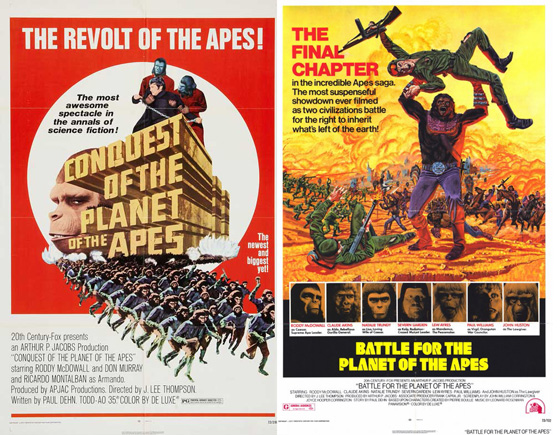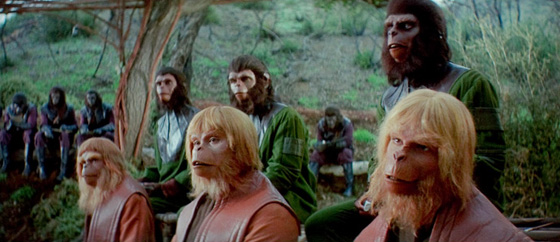
Producer Arthur P. Jacobs just couldn’t leave his monkeys well enough alone. Escape from the Planet of the Apes (1971) picked up the saga right where it seemed permanently roadblocked – Charlton Heston had detonated the entire planet, and every ape, human, and atom bomb-worshiping mutant with it. But thanks to some handy time travel, Cornelius, Zira, and the doomed Dr. Milo were able to travel to contemporary America and (accidentally) spread the word of an ape-dominated future leading to a global apocalypse. Escape ended with another downbeat climax, but this time left open the possibility of another franchise entry: in a massacre led by government scientist Dr. Hasslein, it seems that the child of Cornelius and Zira has been killed along with his parents…but an epilogue reveals that the murdered baby was just (just!) an ordinary chimpanzee, the true offspring having been delivered to their trusted friend, circus ringmaster Armando (Ricardo Montalban). The low-budget film was enough of a hit that, sure as the sunrise, another year brought another entry in the saga, Conquest of the Planet of the Apes (1972). These were essentially the Saw or Paranormal Activity films of the day, except that moviegoers clamored to see more of Roddy McDowall in an ape-mask, rather than torture-traps or self-moving furniture.
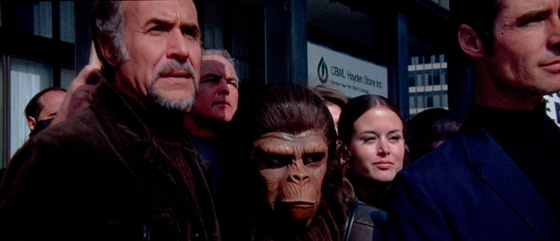
Armando (Ricardo Montalban) and Caesar (Roddy McDowall) witness anti-ape violence in the streets.
But here’s the thing: Conquest of the Planet of the Apes is far from being tired, overworked material. The series finds a second wind, takes some risks, and easily earns its place as the best of the sequels; in fact, unlike Beneath the Planet of the Apes (1970) or Escape, Conquest finally justifies the notion of continuing the story past Heston and the Statue of Liberty. Conquest isn’t commercial; it’s political. The film begins many years after Escape, with the now-grown son of Cornelius and Zira, Caesar (Roddy McDowall, again), bearing witness to a United States that’s beginning to resemble a police state. An improbable series of events has led us here, prophesied in the previous film: Cornelius’ space capsule contained a virus which contaminated the planet, killing all the cats and dogs. Mankind began to domesticate apes and raise them as pets and, eventually, servants. The subservient apes have begun to evolve at a rapid rate. Some humans complain that the apes are putting them out of a job; protestors seen at the opening of the film are carrying signs which read “Hire Men Not Beasts,” “Go Human Not Ape,” and “To Err is Human, To Serve Should Be.” Apes, meanwhile, go about their menial chores. They’re bred and distributed by the government like slaves. Caesar, the only ape with the gift of speech, entertains thoughts of revolution following Armando’s tragic, martyr-like death.
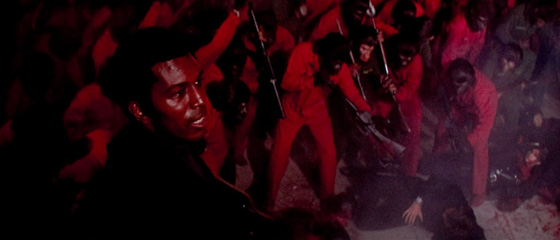
MacDonald (Hari Rhodes) pleads with Caesar during the bloody climax of "Conquest of the Planet of the Apes."
Decades before Rise of the Planet of the Apes (2011), Conquest essentially tells the same story: you root for the apes as they turn against their human captors. Both films reverse the formula of the original Heston film and draw ironic parallels, as the humans are now the sadists and bigots, refusing to see the apes as possessing intelligence or feeling. The fascination of Conquest is watching how Caesar transitions from an innocent – just out of the circus, seeing the big city for the first time – to a violent revolutionary, organizing his apes as they gather a formidable collection of arms and explosives right under the noses of their masters. When the revolution finally begins, it’s not cathartic, but uncomfortably brutal. First the humans open fire on the apes, ruthlessly slaughtering their ranks. Then the apes retaliate by summoning their bestial side, bashing the faces of the soldiers into bloody pulp, in startling shots restored to the film in its “uncut” print on DVD and Blu-Ray. The only human who has the ear of Caesar is MacDonald (Hari Rhodes), an aide to the governor, and the only man, apart from the deceased Armando, who has shown Caesar kindness and respect. But in the final, fiery moments, Caesar refuses to listen to the pleas of his friend: “We can’t be free until we have power. How else can we achieve it?” Caesar asks. And this film does not dismiss his question, ending before it can arrive at an answer. Conquest is undoubtedly flavored by events of the late 60’s, and reflects them through the prism of science fiction more organically than the previous two films. It is comparable to Invasion of the Body Snatchers (1956) and Night of the Living Dead (1968) in its intelligent treatment of contemporary anxieties using genre-ready metaphors; and it continues to echo through events of today: living in Wisconsin under a Republican governor who, famously, has stripped public employee unions of their collective bargaining rights, I was surprised and amused to hear the soldiers bark at the apes, “The labor demonstration on the south plaza will be terminated in five minutes…failure to comply with this order can result in the one-year suspension of your rights to bargain collectively.”
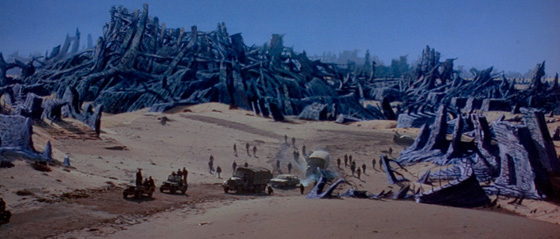
The last vestiges of humanity declare war upon the apes in "Battle for the Planet of the Apes."
It’s a disappointment, then, to arrive at the series’ final entry, Battle for the Planet of the Apes (1973), which dulls the edges of the commentary and satire and substitutes rote action and large swaths of tedium. Some years later, in a post-apocalyptic Earth, Caesar (McDowall) works to keep the peace in the fledgling ape society, fending off the militaristic and destructive tendencies of the gorillas. (As established in earlier films, the gorillas are soldiers, the orangutans are politicians, and the chimpanzees are scientists and intellectuals.) Meanwhile, irradiated humans in the ruins of New York plan a final attack on the apes. That’s about it. What’s most interesting in Battle is the casting: apart from the ever-loyal McDowall, the film introduces us to the monolithic Lawgiver, played by John Huston in sequences which bookend the story, and Virgil, an orangutan played by singer/songwriter/actor Paul Williams. Maintaining some continuity, Natalie Trundy returns as Lisa, Caesar’s love interest from Conquest; and Austin Stoker (Assault on Precinct 13) takes over the role of MacDonald. Claude Akins (Rio Bravo) and Lew Ayres (All Quiet on the Western Front) have roles, and John Landis plays an ape extra (he will tell you of his experiences over at Trailers from Hell). The film seems to be an afterthought, with the texture of a 70’s TV movie; which is appropriate, since it was television that the series was headed next. But Battle doesn’t really have to be any good – it succeeds only by existing, bringing the series into a kind of Möbius strip that thrives on its own paradox. Theoretically, you can jump into the series at any point, and watch them in a loop. For science fiction cinema, this was a considerable accomplishment. The genre had its first epic saga.
